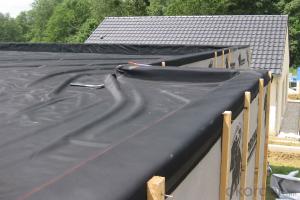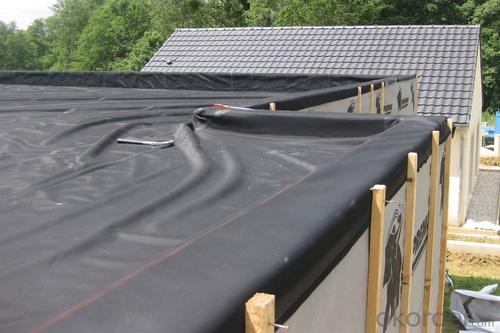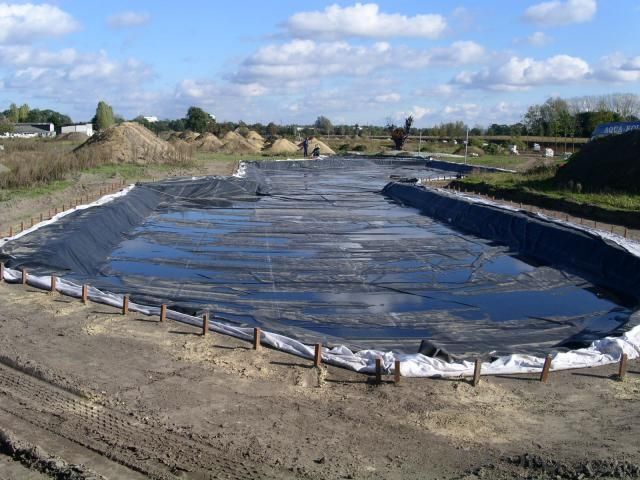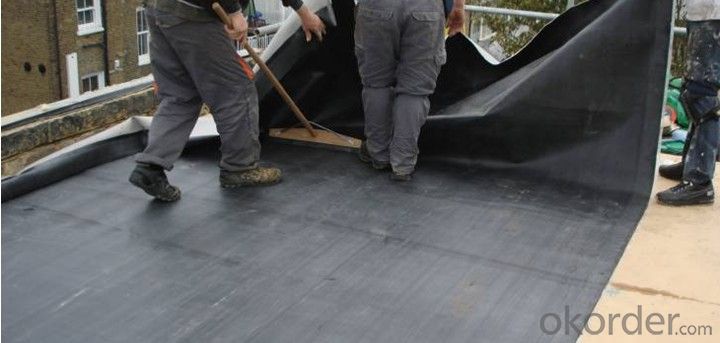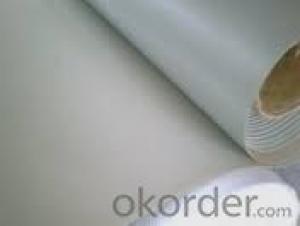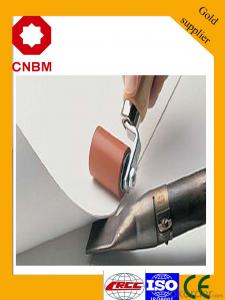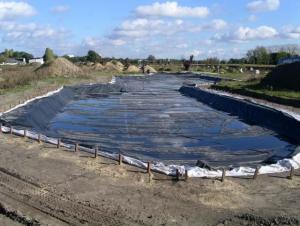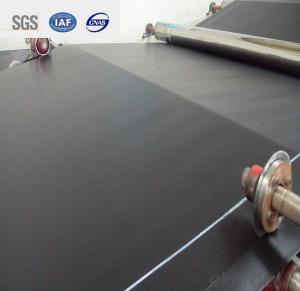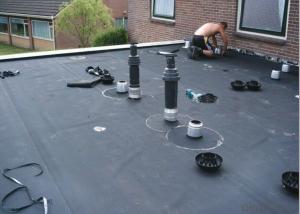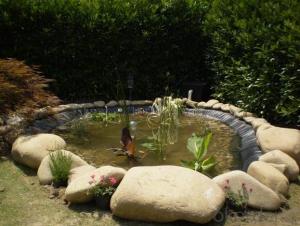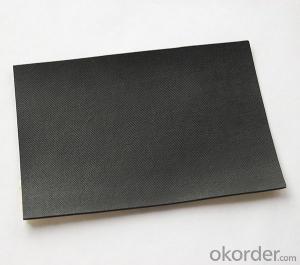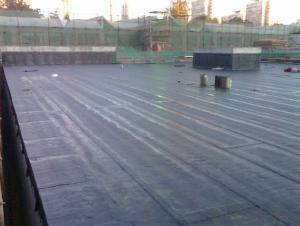EPDM Rubber Waterproof Membrane for Housetop
- Loading Port:
- Shanghai
- Payment Terms:
- TT OR LC
- Min Order Qty:
- 50000 m²
- Supply Capability:
- 5000000 m²/month
OKorder Service Pledge
OKorder Financial Service
You Might Also Like
EPDM Rubber Waterproof Membrane for Housetop
Description Of EPDM Rubber Waterproof Membrane for Housetop:
This waterproof coiled material is of high elasticity with best performance among high polumer waterproof coiled material in the world.It is also the most typical one in the world.Waterproof coiled material made of ternary ethylene-propylene rubber is produced with the use of the most advanced contiuous extrusion and vulcanization technology and related equipments which are specially designed for production of such product.It is good in compactness,without bubble and performance difference in length and breadth,perfomances reach or exceed the demands of GB18173.1-2000 standard.
Main Features of EPDM Rubber Waterproof Membrane for Housetop:
1.EPDM waterproof membrane for bridge engineering waterproof
2.EPDM waterproof membrane for water conservancy projects ,such as river bank,lake dam seepage.
3.EPDM waterproof membrane for the municipal engineering.
4.EPDM waterproof membrane for aquaculture.
Specifications of EPDM Rubber Waterproof Membrane for Housetop:
| Number | Item | Unit | Value | |
| 1 | Size Variation | Thichness | % | ±10 |
| Width | % | ±1 | ||
| Length | % | Allowed negative | ||
| 2 | Breaking tensile strength at normal temperature | Mpa | ≥7.5 | |
| Breaking tensile strength at 70°C | Mpa | ≥2.3 | ||
| 3 | Breaking elongation at normal temperature | % | ≥450 | |
| Breaking elongation at -20°C | % | ≥200 | ||
| 4 | Tear strength | KN/m | ≥25 | |
| 5 | Impermeability(30min) | * | 0.3Mpa no leakage | |
| 6 | Bending at low tempreture | °C | ≤-40 | |
| 7 | Stretch tensor at heating | Elongate | mm | ≤2 |
| Shrink | mm | ≤4 | ||
| 8 | Air oven aging(80°C×168h) | Tensile strength at break retained | % | ≥80 |
| Elongation at break retained | % | ≥70 | ||
| 9 | Anti-alkali | Tensile strength at break retained | % | ≥80 |
| Elongation at break retained | % | ≥80 | ||
| 10 | Nuture weathing at manual simulation | Tensile strength at break retained | % | ≥80 |
| Elongation at break retained | % | ≥70 | ||
Applications of EPDM Rubber Waterproof Membrane for Housetop:
Widely used in roofs, basement, toilet ,swimming pool, and all kinds of industry and civil building waterproofing, reservoir, vivicism, bridge, underground, tunnel and dam waterproofing ,especially to the keystone waterproofing projects which is durability, high corrosion resistance and easy deformation.
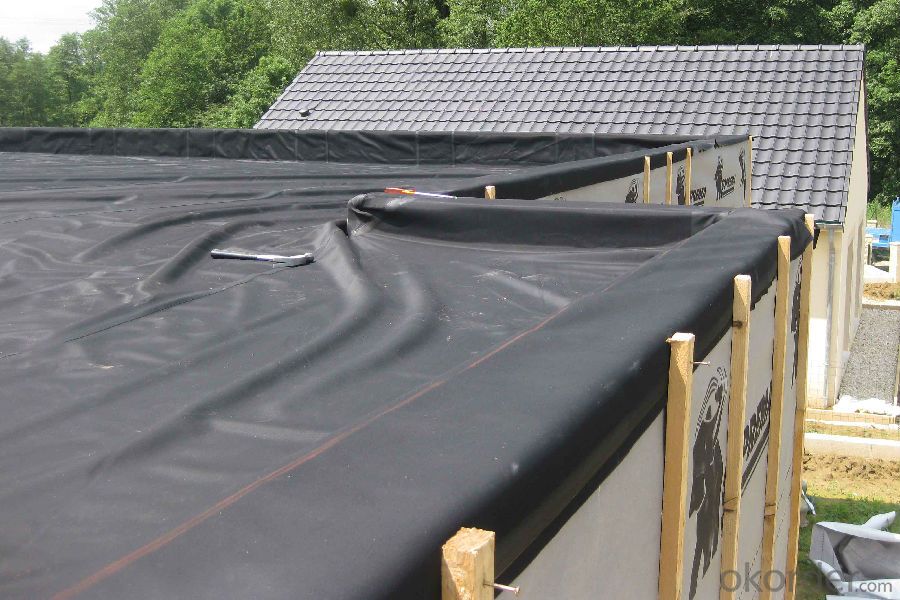
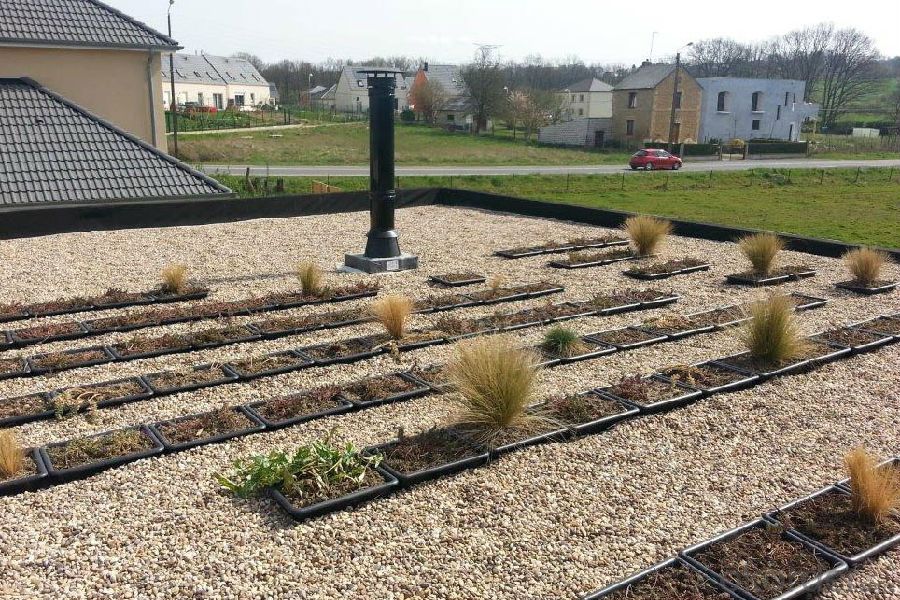
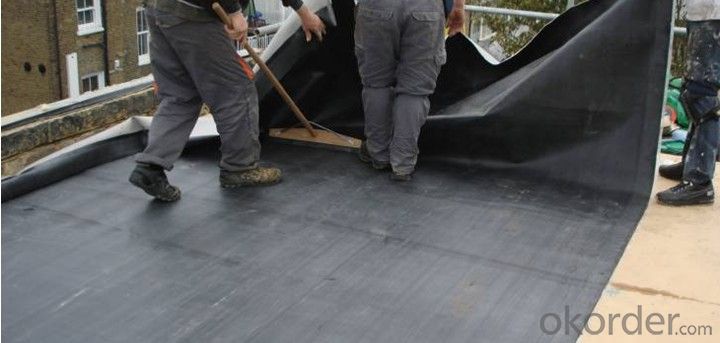
IMages of EPDM Rubber Waterproof Membrane for Housetop:
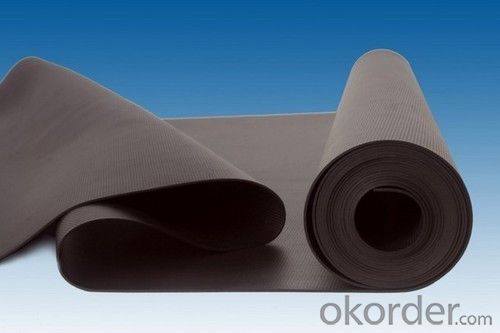
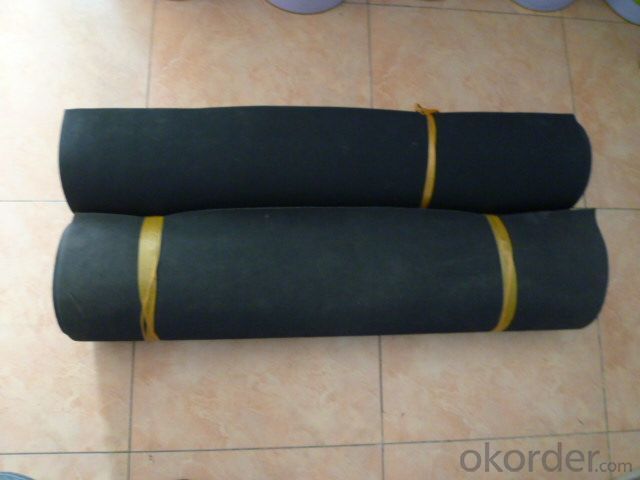
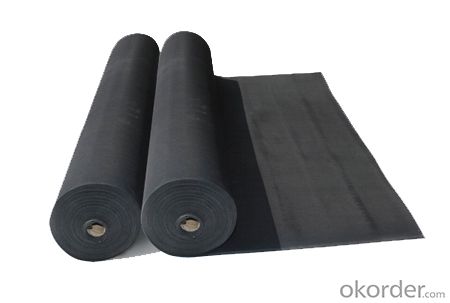
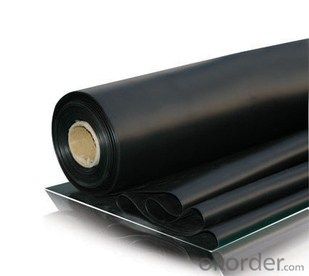
FAQ of EPDM Rubber Waterproof Membrane for Housetop:
1. What are we supplying?
We are specialized in producing Colorful Asphalt Roof Shingle, SBS/APP modified bitumen waterproof membrane, Self adhesive bitumen waterproof membrane, PVC waterproofing membrane, EPDM rubber roofing membrane, Single Component Polyurethane Waterproof Coating, and Spray Polyurea Waterproof Coating
.
2. How Many years experience do we have?
We have been exported to more than 20 countries in the past 15 years.
3. How long do we usually reply your request?
We always reply our customer within 24 hours.
- Q: Can a waterproofing membrane be used in conjunction with tile or stone installations?
- Certainly! When installing tile or stone, it is highly recommended to utilize a waterproofing membrane. This membrane serves as a barrier, preventing water from seeping into the underlying layers and causing damage. It is especially beneficial in wet areas, such as bathrooms, showers, and kitchen backsplashes. There are different types of waterproofing membranes available, such as liquid-applied, sheet, and fabric membranes. These can be applied to the substrate before installing the tile or stone, creating a waterproof layer that keeps the area dry and free from water-related issues. In addition to safeguarding against water damage, a waterproofing membrane also helps to prevent the growth of mold and mildew, which can be detrimental to both the installation and the health of those using the space. It is essential to note that proper installation of the waterproofing membrane is crucial for its effectiveness. Following the guidelines and best practices provided by the manufacturer ensures a tight seal and complete coverage. Overall, integrating a waterproofing membrane with tile or stone installations is a prudent decision. It enhances the project's durability and longevity while providing peace of mind against potential water damage.
- Q: Can a waterproofing membrane be used for a balcony deck coating?
- Yes, a waterproofing membrane can be used for a balcony deck coating. Waterproofing membranes are designed to create a protective barrier that prevents water penetration, making them an ideal choice for balcony decks. By applying a waterproofing membrane to the deck surface, you can prevent water damage, such as leaks, cracks, and deterioration, which can lead to costly repairs. Additionally, waterproofing membranes can also protect the underlying structure of the balcony from moisture damage, extending its lifespan. It is important to choose a high-quality waterproofing membrane that is specifically designed for outdoor use and can withstand exposure to harsh weather conditions.
- Q: Can a waterproofing membrane be used on precast chrome surfaces?
- Yes, a waterproofing membrane can be used on precast chrome surfaces. The membrane will provide a protective barrier against water penetration, ensuring the durability and longevity of the precast chrome surfaces.
- Q: Can a waterproofing membrane be used for underground parking structures?
- Yes, a waterproofing membrane can be used for underground parking structures. Underground parking structures are particularly vulnerable to water infiltration due to their location and exposure to groundwater. Waterproofing membranes are designed to provide a protective barrier against water penetration, preventing potential damage to the structure and its contents. These membranes are typically applied to the exterior walls and floors of the underground parking structure, ensuring a watertight seal. Additionally, the use of a waterproofing membrane can also help to prevent the formation of moisture-related issues such as mold growth, corrosion, and deterioration of concrete. Therefore, incorporating a waterproofing membrane is essential for the long-term durability and functionality of underground parking structures.
- Q: Are waterproofing membranes suitable for commercial applications?
- Indeed, waterproofing membranes prove to be a fitting choice for commercial applications. Specifically designed to safeguard buildings, structures, and surfaces from water infiltration, moisture damage, and similar issues, waterproofing membranes are frequently employed in diverse commercial scenarios such as roofs, basements, underground parking garages, and exterior walls. Commercial structures face a wide array of weather conditions and water sources, encompassing rainfall, snowfall, and groundwater. Waterproofing membranes serve as a dependable barrier, effectively preventing water penetration and averting costly water-related harm. Furthermore, they serve as a vapor barrier, mitigating moisture accumulation and condensation within the building envelope, which may otherwise lead to mold growth and structural decay. Waterproofing membranes are obtainable in various materials including bitumen, modified bitumen, EPDM, PVC, and TPO. Each material boasts distinct advantages and characteristics, allowing for flexibility in choosing the most appropriate option for specific commercial applications. They can be applied as liquid coatings, sheets, or panels, providing versatility in terms of installation methods to accommodate diverse building designs and requirements. Moreover, waterproofing membranes can be tailored to cater to specific commercial needs such as fire resistance, UV protection, and durability. This renders them highly effective in safeguarding commercial properties that may be subjected to heavy foot traffic, mechanical equipment, or other potential sources of damage. To summarize, waterproofing membranes prove to be an exceptionally suitable solution for commercial applications. They offer reliable protection against water infiltration, moisture damage, and related issues, ensuring the longevity and structural soundness of commercial buildings. Their versatility, customizable options, and ability to withstand various weather conditions make them an outstanding choice for commercial waterproofing requirements.
- Q: Can a waterproofing membrane be used on plastic block surfaces?
- Yes, a waterproofing membrane can be used on plastic block surfaces.
- Q: Can a waterproofing membrane be applied on both interior and exterior surfaces of a structure?
- Both interior and exterior surfaces of a structure can receive the application of a waterproofing membrane. These membranes are designed to form a barrier that prevents water from infiltrating the structure. Regardless of whether it is applied internally or externally, the membrane serves the same purpose of keeping water out and safeguarding the structure against moisture damage. In the case of basements, crawl spaces, or other areas where water intrusion from the inside is a worry, interior waterproofing membranes are typically utilized. On the other hand, exterior waterproofing membranes are commonly used on foundation walls, below-grade areas, or building envelopes to stop water from seeping into the structure. It is crucial to select the appropriate type of waterproofing membrane based on the specific requirements and conditions of the structure.
- Q: Can a waterproofing membrane be used on stadium seating areas?
- Indeed, stadium seating areas can benefit from the application of a waterproofing membrane. Typically utilized to shield structures from water-related harm, such as roofs, basements, and decks, waterproofing membranes prove invaluable. Stadium seating areas, being frequently exposed to the elements like rain and snow, are susceptible to water damage if not adequately safeguarded. The implementation of a waterproofing membrane effectively thwarts water infiltration, thereby averting potential predicaments including mold proliferation, material deterioration, and structural impairment. It is crucial to select a top-notch waterproofing membrane specifically formulated for outdoor usage, capable of enduring heavy foot traffic, thus guaranteeing enduring protection for the stadium seating areas.
- Q: Can waterproofing membranes be applied over existing surfaces?
- Yes, waterproofing membranes can be applied over existing surfaces. In fact, this is a common practice in construction and renovation projects. Waterproofing membranes are designed to provide a protective barrier against water infiltration, and they can be applied over various surfaces such as concrete, wood, metal, or even other waterproofing systems. By applying a waterproofing membrane over an existing surface, it helps to prevent water damage, including leaks, mold growth, and structural deterioration. However, it is important to ensure that the existing surface is properly prepared and cleaned before the membrane application to achieve optimal adhesion and performance. Additionally, it is recommended to consult with a professional waterproofing contractor to determine the most suitable membrane type and installation method for the specific project requirements.
- Q: Can a waterproofing membrane be used on swimming pool decks?
- Indeed, swimming pool decks can benefit from the use of a waterproofing membrane. The purpose of these membranes is to effectively block water infiltration, which makes them particularly suitable for safeguarding areas that are constantly exposed to moisture, like swimming pool decks. Typically, these membranes are applied directly onto the deck's surface, creating an impermeable and long-lasting layer. This ensures that water does not permeate the deck, thus averting potential harm caused by dampness, such as cracks, the growth of mold, or structural decline. Furthermore, waterproofing membranes offer additional advantages, including prolonging the lifespan of the deck and enhancing its overall aesthetic appeal.
Send your message to us
EPDM Rubber Waterproof Membrane for Housetop
- Loading Port:
- Shanghai
- Payment Terms:
- TT OR LC
- Min Order Qty:
- 50000 m²
- Supply Capability:
- 5000000 m²/month
OKorder Service Pledge
OKorder Financial Service
Similar products
Hot products
Hot Searches
Related keywords
